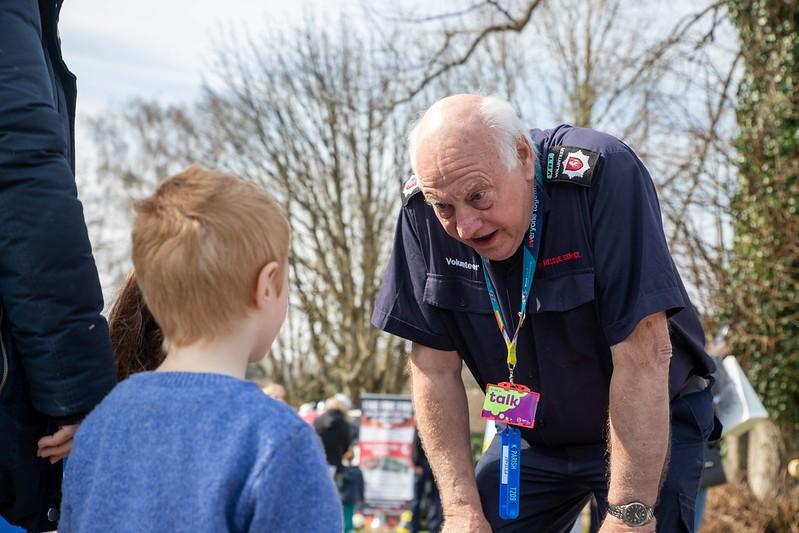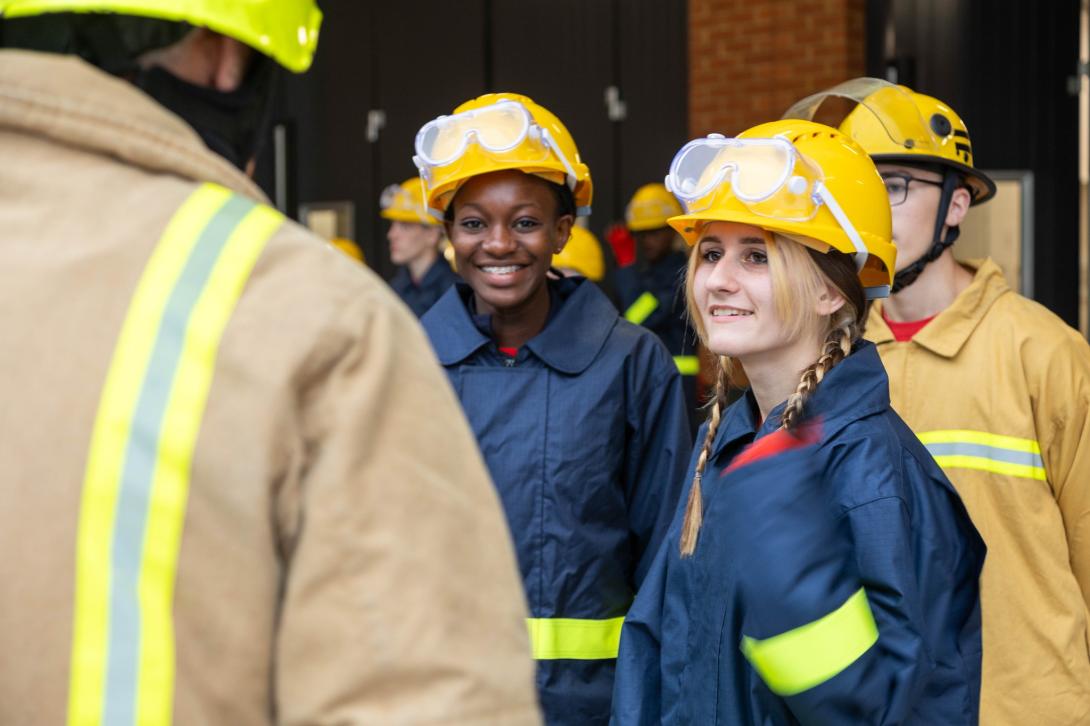Our impact on people
We are committed to excellence, meeting high standards of customer experience and fostering a culture of belonging for our people, customers and communities. Our 'Everyone' approach supports our ambitions to build upon our impactful work.
Everyone matters and together every one of us helps to save lives.
What is Everyone?


Everyone belongs
Everyone is unique. We embrace this uniqueness, treating everyone as equals and ensuring the same opportunities are available to all. We strive to build open relationships based on trust, compassion and use of kind language, leading to a sense of belonging.

Everyone is different
Valuing difference in all its forms makes KFRS the organisation it is. Supporting and encouraging people to grow, thrive and be themselves goes to the heart of who we are, what we do and our success. Our differences support us in helping our customers

Everyone can be curious
Encouraging a greater curiosity to learn about each other and our customers is at the heart of who we are. Taking time to talk and explore our differences is everyone’s responsibility. It helps us all to grow and in turn enables us to understand and help our customers.
Fostering a culture of belonging at Kent Fire and Rescue Service
Equality
- is ensuring everyone has access to the same opportunities and services
- is being open to everyone, embracing difference
- is ensuring everyone has an equal opportunity to make the most of their life and career
- is not sameness
Diversity
- is what makes everyone different
- is not about labels or labelling people
- of thought has a positive impact in our workplace
- makes us unique, enabling us to thrive by embracing our differences
Inclusion
- is celebrating diversity, its importance and the value it brings
- is recognising and reflecting our constantly changing and different society
- creates an environment that values and welcomes everyone, helping everyone feel they belong
- is embracing everyone, together
Learn more ...
Inclusive language
As a service we are committed to ensuring we demonstrate fairness, sensitivity and respect in all aspects of our work and in relation to the lives of our customers and each other. Together we help to save lives, working as one team.
Our commitment to fostering a culture of belonging is also demonstrated by the language we use. What we say and how we say it can have a huge impact on people around us. Remembering to speak and write with respect and kindness lies at the heart of who we are.
Inclusive language takes into the account the needs and differences of everyone.
It should not be:
- patronising or stereotypical
- discriminative
- negative
Language and the Equality Act 2010
The language we use should take into account the protected characteristics–elements of our identity that are known to be judged by society. The Equality Act 2010 protects us all by making it illegal to discriminate against or harass someone because of these characteristics. The language we use should be both kind and inclusive.
Further guidance
For further guidance please see our Brand Guidelines
Positive action
Positive action and why we do it?
Positive action is the removal or reduction of the effect of discrimination in the employment market.
We do this because it is widens the pool of talented, skilled and experienced people from which to recruit and is lawful under the Equality Act, 2010.
As an Equal Opportunities employer, we are committed to equality, including making sure our recruitment, selection and promotion process encourages applications from a wide range of people, reflecting the difference in our customers.
We are committed to attracting the best candidates from all backgrounds.
Positive action - not positive discrimination
Positive action should not be confused with positive discrimination.
Positive discrimination is the act of favouring someone based on a ‘protected characteristic’ and is unlawful. Setting quotas or benchmarks in the recruitment process to take on a proportion of people from a protected characteristic group, or promoting a specific number of people within a minority group would be positive discrimination, We do not adopt this type of initiative, and only select the best candidates based on their performance, skills and merit.
Protected characteristics
We recognise that everyone belongs and everyone is different and unique. We strive to ensure everyone has equal access to our services and does not experience any discrimination or harassment because of a protected characteristic.
What is a protected characteristic?
The nine protected characteristics are specified in the Equality Act, 2010, which makes it illegal to discriminate or harass someone because of a protected characteristic.
The protected characteristics as set out in the Equality Act 2010 are:
- age
- disability
- gender reassignment
- sex
- sexuality
- race
- marriage and civil partnership
- pregnancy and maternity
- religion and belief
Gov.uk publish helpful guidance 'Discrimination:your rights'.
Our communities
Understanding our local communities is vital to our work. We analyise local and national data enabling us to profile community risks and ensure that we continue to provide the services that people need. We also identify emerging trends so that we can continuously develop our services for the future.
We seek to understand our customers and communities through events, programmes and visits. We also consult with the public and colleagues, including community groups through our Community Risk Management Plan (CRMP) consultation process.
We use this data (including equality data) to help make good decisions for our community and workplace through the use of a tool called a 'People impact assessment', also known as 'equality impact analysis'.
The Equality Act, 2010, requires us to consider each protected characteristic in conjunction with our activity to ensure that we are:
- eliminating discrimination and promoting inclusion
- encouraging the development, growth and maintenance of ideas and attitudes which result in good or improved relations between the individuals in different groups
- minimising or removing disadvantage experienced by people who share a protected characteristic, reducing their under-representation in particular activities and meeting their particular needs. A people impact assessment is an ideal tool to help us ensure we do this.
In addition we use incident data, debriefs and surveys to identify who uses our services, which groups of people are most or least likely to use them in the future and to obtain feedback. This information is utilised as part of our CRMP process.
Our colleagues
We strive to create a great place to work and volunteer and we want to ensure it is an equitable one. We monitor the composition of our workforce through analysis of equality data (protected characteristics such as age, gender, etc). Our colleagues have a voice in how we develop our policies and we hold ourselves to account by creating opportunities for colleague feedback. The Equalities Act 2010 requires us to demonstrate our compliance with the public sector equality duty and publish a gender pay gap report. This report shows the differences in average pay between men and women (Please note this is not the same as Equal Pay which is the difference between men and women who carry out the same or similar jobs or work of equal value). In addition to Gender Pay gap reporting, although it is not a legal requirement, our last report also looked at disability, ethnicity and sexual orientation pay gaps within our workforce.
Partnerships
We have partnerships with other local authorities, agencies, community groups and charities Working with these partners helps us to engage with communities and meet their diverse needs.
Armed Forces Covenant
Kent Fire and Rescue Service is proud to hold an Employer Recognition Scheme Gold Award under the Defence Employer Recognition Scheme. This means that we support the armed forces community and our values are in accordance with the Armed Forces Covenant.
Learn about the Armed Forces Covenant and why it is important on our Armed Forces Covenant page.
Gender Pay Gap Reports
Each year Kent Fire and Rescue Service (KFRS) publishes a Gender Pay Gap Report. A gender pay gap is the difference between the average earnings of men and women, expressed relative to men's earnings. Our Gender Pay Gap Reports are available on our Publications page.
We continuously work towards reducing inequality, not only in terms of gender pay, but ethnicity, sexual orientation and disability too. This can be evidenced by our gender pay gap (GPG) which is lower than the national figures, and our policy of reducing inequality further.
Reasonable Adjustments – Our Disability Statement
From the moment you apply to work or volunteer with us we would like to encourage you to declare if you feel you need additional support from us. We are dedicated to creating an inclusive work environment where all colleagues and volunteers, including those with disabilities can thrive. We recognise the value of diversity and are committed to ensuring equality for all.
We operate an open approach to reasonable adjustment for those living with disability. We recognise that support for one person may not be suitable for another, even if they have the same or similar conditions.
We would encourage you to declare your disability when asked for your equality data. This will prompt our resourcing team to contact you and explore what support we may be able to offer. Sharing your needs with us, helps us to ensure you are not disadvantaged. It also enables you to perform to the best of your ability
Please do share any adjustments you have previously received and / or for you to think about what type of support you might look for from us. There are various adjustments available and the solution for you may consist of more than one.
A reasonable adjustment could involve making changes to:
- the workplace environment
- equipment or services provided (both current or new services), for example assistive technology or an appropriate keyboard for someone with arthritis
- the ways things are done
- ensuring information is in an accessible format
Examples of reasonable adjustments can include:
- providing the right type of phone for those using a hearing aid
- arranging for an interview to be held on the ground floor for wheelchair users
- providing desks or ergonomic chairs for those with disability affecting their backs
- one-to-one support to help prioritise the work for someone suffering from anxiety
- a phased return to work for those on long-term sick because of a disability
- allowing more frequent breaks for someone with diabetes to get the right amount of food or drink throughout the day
- provide more time, rest breaks, use of a laptop, provision of software packages to support those with neurodiversity as part of the interview process
We recognise some people may be unsure if they meet the criteria for reasonable adjustment or feel uncomfortable declaring a disability. We are here to help so if unsure please do not hesitate to contact the Resourcing team on 01622 692121 extn 2381 to discuss.
#TogetherAgainstHate
Everyone, regardless of differences has the right to live and work without fear of abuse or discrimination.
What is hate crime? Hate crime is criminal behaviour that is driven by hostility - or the demonstration of hostility- towards another person’s religion, race, disability, sexual orientation or transgender identity. It can take many forms ranging from intimidation to verbal abuse and assault and can include damaging property.
TogetherAgainstHate is a global fight to tackle online hate crime - using digital platforms to help drive change and build kindness. We recognise social media has become a vehicle for inappropriate behaviour on a societal level, and some people think that it is OK to post abusive messages including hate and discrimination.
We don’t.
At Kent Fire and Rescue Service (KFRS) we want our social media platforms to be for everyone and to be inspiring. We strive for them to be respectful spaces for discussion and an opportunity to engage with each other to share information about how we can all live safer lives.
We know the vast majority of our followers want that too.
As a public service we have a duty to make sure we create safe environments where online abuse is stopped and reported. It is important to us that we remain focused on the welfare of our customers, staff and volunteers.
We have a zero-tolerance approach to online hateful language on all our social and digital platforms.
We will take the following action
- delete comments that promote hate or discrimination
- block people bringing hate to our comments sections
- report the most serious cases to the relevant authorities
- work to make our social media accounts kind and respectful places
- keep building and sharing our safety messages and keep helping every one of our customers to live safer lives
- keep supporting all of our different customers – whoever they are
- make sure our social media profiles are a safe space for everyone
We also want your help...
If you see a reply to KFRS posts with an expression of hate on the basis of race, colour, gender, nationality, ethnicity, disability, religion, sexuality, sex, age or class please flag the URL to the post in question by emailing - Togetheragansthate@kent.fire-uk.org
Together we will strive to make our social media accounts a safe space for everyone.
In an emergency
Where a hate crime is in progress or someone is in immediate danger – you should always call 999.
You can report a hate crime directly to the police by calling the non-emergency number 101.
Hate crimes in England can be reported to the Police online through True Vision at report-it.org.uk
You can also report hate crime to the following independent organisations that support those communities most at risk and offer an alternative way of reporting if you don’t want to report to the police, including:
Stop Hate UK (all hate crime)
Tell Mama (anti-Muslim hate crime)
Community Security Trust (anti-Semitic hate crime)
GALOP (anti-LGBTQ+ hate crime).
Equal Pay
Women and men have the right to receive equal remuneration for work of equal value (commonly referred to as ‘equal pay’). It is good practice for organisations to review their pay and benefits structures to ensure Equal Pay.
It also assists KMFRA in complying with the requirements of the Public Sector Equality Duty. Equal pay differs to gender pay which considers the difference between men’s and women’s average earnings.
Kent and Medway Fire and Rescue Authority (KMFRA) last did an equal pay audit in 2017. Using a snapshot date of 31 March 2022 we reviewed equal pay again in March 2023. This report does not include Volunteers or members. Similar to the review in 2017, this review has concluded there was no evidence of any disparity between pay and sex.
Some disparity was noted in relation to contractual terms between colleagues working in the same department carrying out the same or a similar job. We will progressively address this disparity through the conversion of grey book roles to green book roles as people retire to assure no adverse impact on individual's pensions. This will of course take some time.
The review document can be found on our Publications page under the 'Reports' section. (Please be aware this report is currently only available as a PDF).
